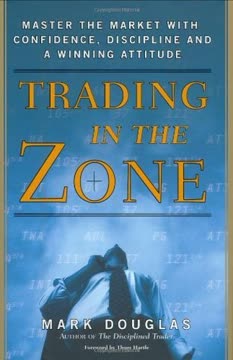Key Takeaways
1. Successful traders adapt to changing market conditions
"It's been a game of adaptation ever since, but the core remains the same."
Flexibility is key. The most successful traders are those who can adapt their strategies to evolving market conditions. This includes:
- Adjusting to changes in volatility
- Modifying trading techniques as technology advances
- Staying informed about global economic and political events
Traders must be willing to abandon strategies that no longer work and embrace new approaches. This requires continuous learning and a willingness to step out of one's comfort zone.
2. Discipline and risk management are crucial for long-term success
"Discipline. I don't know how many times and how many guys I've worked with that hang onto their losers and they get into this hope mode."
Protect your capital. Successful traders prioritize risk management and maintain strict discipline in their trading approach. This includes:
- Setting and adhering to stop-loss levels
- Avoiding the temptation to average down on losing positions
- Managing position sizes relative to account balance
By focusing on preserving capital and minimizing losses, traders can survive drawdowns and maintain longevity in the markets. Discipline also extends to following a well-defined trading plan and avoiding impulsive decisions based on emotions.
3. Develop a unique trading style that fits your personality
"I came to understand that you can't pick the top and the bottoms of your trades, you just got to be willing to take money while it's still in your favor and cut your losers small."
Find your niche. Each trader must develop a unique approach that aligns with their personality, risk tolerance, and lifestyle. This may involve:
- Experimenting with different timeframes (day trading, swing trading, long-term investing)
- Focusing on specific markets or instruments (stocks, futures, forex)
- Developing a personal edge through specialized knowledge or skills
Traders should avoid blindly copying others and instead focus on understanding their own strengths and weaknesses. This self-awareness allows for the creation of a sustainable trading strategy that can be executed consistently over time.
4. Learn from mistakes and continuously refine your strategy
"My honest opinion is there's really only two good moves during the day. Why does a guy need more than that?"
Embrace failure as a learning opportunity. Successful traders view losses and mistakes as valuable lessons that contribute to their overall growth. This mindset involves:
- Keeping detailed trading journals to analyze performance
- Conducting regular post-trade reviews to identify areas for improvement
- Seeking feedback from mentors or peers
By continuously refining their approach based on real-world experience, traders can improve their decision-making and increase their odds of success over time.
5. Focus on high-probability setups and avoid overtrading
"I think to me, or at least for what I'm doing, it's getting harder the longer I'm in the business. So I'm actually working harder."
Quality over quantity. Successful traders prioritize high-probability setups and avoid the temptation to overtrade. This approach includes:
- Developing strict criteria for trade entry and exit
- Patiently waiting for ideal market conditions
- Resisting the urge to trade out of boredom or FOMO (fear of missing out)
By focusing on quality trades rather than quantity, traders can reduce transaction costs and improve their overall profitability. This disciplined approach also helps manage stress and prevent burnout.
6. Emotional control is essential for consistent performance
"It's a big psychological game. If I had a fight with my wife or something like that I might not even trade, if I'm in the wrong state of mind."
Master your emotions. Successful traders recognize the importance of maintaining emotional equilibrium while trading. This involves:
- Developing techniques to manage stress and anxiety
- Cultivating a mindset that views losses as part of the process
- Avoiding revenge trading or other emotionally-driven decisions
Traders who can maintain emotional control are better equipped to execute their strategies consistently and avoid costly mistakes driven by fear or greed.
7. Understand market psychology and sentiment
"I try to think like the guys on the floor, meaning, if I were a rookie, where would I put my stop? I try to figure out where they are going to run their stops."
Read the crowd. Successful traders develop an understanding of market psychology and use this knowledge to inform their decisions. This includes:
- Analyzing sentiment indicators and positioning data
- Identifying potential areas of support and resistance based on crowd behavior
- Recognizing patterns of market overreaction or complacency
By understanding how other market participants are likely to behave, traders can position themselves to take advantage of crowd psychology and improve their timing.
8. Use technology and tools to enhance your trading
"I have several different packages that I use. I have a couple of algorithms I've developed myself and have written with several guys."
Leverage technology. Successful traders utilize a range of tools and technologies to enhance their trading performance. This may include:
- Advanced charting and analysis software
- Automated trading systems or algorithms
- Real-time news and market data feeds
By leveraging technology, traders can improve their ability to identify opportunities, manage risk, and execute trades efficiently. However, it's important to remember that tools are supplements to, not substitutes for, sound trading judgment.
9. Balance trading with other aspects of life
"This whole thing has helped us to just be able to do what we love to do and spend a lot of time with our family."
Maintain perspective. Successful traders recognize the importance of balancing their trading activities with other aspects of life. This includes:
- Setting realistic financial goals and avoiding excessive risk-taking
- Engaging in activities outside of trading to reduce stress
- Prioritizing relationships and personal well-being
By maintaining a healthy work-life balance, traders can sustain their performance over the long term and avoid burnout. This perspective also helps traders maintain emotional stability during periods of market volatility.
10. Cultivate a supportive network and mentorship
"I love helping people because it also helps me. I learn from it and maybe someone who I'm helping out knows something that I don't."
Build relationships. Successful traders recognize the value of learning from others and cultivating a supportive network. This may involve:
- Seeking out mentors or joining trading communities
- Sharing ideas and experiences with fellow traders
- Teaching or mentoring others to reinforce one's own understanding
By engaging with a community of traders, individuals can accelerate their learning, gain new perspectives, and stay motivated during challenging periods. Additionally, teaching others can help solidify one's own understanding and uncover new insights.
Last updated:
Review Summary
Millionaire Traders receives mixed reviews, with an average rating of 3.61/5. Readers appreciate the motivational aspects and insights into successful traders' habits. The book is compared to Market Wizards but considered less informative. Some find it enjoyable and recommend it for beginners, while others criticize its length and lack of specific strategies. It's seen as a good supplement to technical books, offering diverse perspectives on trading styles. Overall, it's valued for its disciplinary lessons and trader stories, though experienced traders may find limited new information.
Similar Books










Download PDF
Download EPUB
.epub digital book format is ideal for reading ebooks on phones, tablets, and e-readers.






